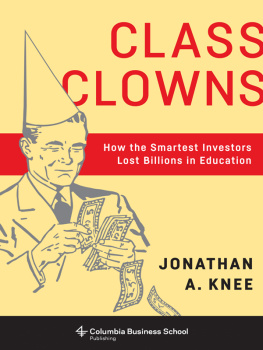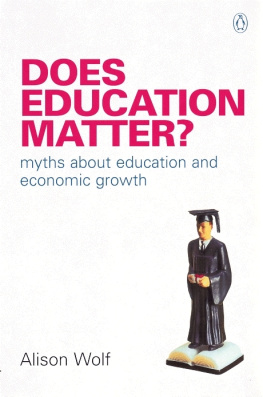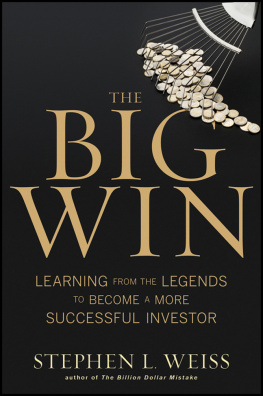Table of Contents
Class Clowns
Columbia University Press
Publishers Since 1893
New York Chichester, West Sussex
cup.columbia.edu
Copyright 2017 Columbia University Press
All rights reserved
E-ISBN 978-0-231-54333-0
Library of Congress Cataloging-in-Publication Data
Names: Knee, Jonathan A., author.
Title: Class clowns : how the smartest investors lost billions in education / Jonathan A. Knee.
Description: New York : Columbia University Press, [2017] | Series: Columbia Business School publishing | Includes bibliographical references and index.
Identifiers: LCCN 2016027438 | ISBN 9780231179287 (cloth : alk. paper)
Subjects: LCSH: EducationEconomic aspectsCase studies. | EducationFinanceCase studies. | InvestmentsCase studies.
Classification: LCC LC65 .K59 2016 | DDC 338.4/337dc23
LC record available at https://lccn.loc.gov/2016027438
A Columbia University Press E-book.
CUP would be pleased to hear about your reading experience with this e-book at .
Cover design: Fifth Letter
For Roger C. Altman, who gave me a job when I needed one and didnt fire me no matter how I tempted him
Contents
which argues that long-held social practices and beliefs can become untethered from their original justifications over time. As a result, the practices and beliefs persist long after the conditions that were the basis for their legitimacy have disappeared.
After Virtue is preoccupied with the roots of the moral virtues generally accepted in Western civilization. I was interested in specifically examining those characteristics that Americans believe make them unique. My hypothesis was that many of these beliefsgrounded either in historical reality or a mythology that emerged over timeare strongly held but contrary to clear empirical evidence. My plan was to explore the genesis and impact of a wide range of these peculiarly American conceits.
Whatever its merits, the project never really got off the ground. Both of my previous books were based on subjects about which I already knew a fair amount. The Accidental Investment Banker, a history of investment banking, used my personal experiences to tell the story of the dramatic changes in the industry during the most recent decade. The Curse of the Mogul came out of a course I and my coauthors had been teaching for years. Although each book required extensive additional research, a deep foundation of data and information was already in place when I began.
This newer literary enterprise, provisionally titled American Lies, would need to be undertaken from a standing start. Whats more, my background as a long-time media investment banker and some-time business school professor didnt make me the most logical chronicler of contemporary cultural peccadillos, no matter how potentially interesting the framework. So I gradually lost my enthusiasmor maybe just my nerve.
A number of the topics I had planned to tackle in American Lies related to fundamentally misguided beliefs that Americans hold about education. For instance, most Americans embrace our anachronisticfrom an international perspective, in any casemethod of choosing first-year university students. Admissions decisions in the United States rely, in part, on essays, recommendations, and extracurricular activities, and there is a broad consensus that these criteria constitute laudable and effective devices to build diverse student bodies. In fact, the historic origin of this approach was the realization by our most selective universities that any of the more objective mechanisms, whether based on test scores or grades and still used almost everywhere else in the world today, would yield too many Jewish students for their taste.
As a media investment banker, I had noted a certain irrationality, particularly in deals undertaken by empire-building moguls in the entertainment industry. Some of these observations had informed the analysis of Curse of the Mogul. Separately, however, I was struck by the fact that in educationa media subsector in which I had been active for more than twenty yearsdeals ended up being as bad as or worse for the buyer but the animating ethos often seemed quite different from that of the entertainment moguls. Quite often the investors actually seemed driven, at least in part, by a genuine desire to improve education, although they were operating under deeply flawed assumptions about the nature of the education business.
It occurred to me that a closer look at how and why otherwise successful investors had failed so spectacularly in education would allow me to pursue some of the questions that had interested me in American Lies while writing about a topic on which I already had some expertise and credibility. I decided to radically shift the books focus accordingly, and this is the result.
My experience as an investment banker since the 1990s introduced me, directly or indirectly, to many of the individuals and transactions highlighted in the book. For instance, I was part of the team that represented the special committee of the board that approved the go-private transaction of Edison Schools. I also represented the seller or the buyeror tried toin many of the other transactions discussed. In all cases, the information contained in the book is based on public information or interviews conducted and materials provided explicitly for this purpose.
In writing Class Clowns, I am particularly appreciative of the dozens of individuals who agreed to talk with me (whether on the record or, more often, on background) and to provide documents relating to the businesses and transactions covered. Even when I was directly involved with a company or situation covered, my focus was not on this books topic. These supplemental conversations accordingly provided me with nuance and perspective that I could not have otherwise obtained.
My greatest debt is to those who slogged through a draft of the entire manuscript and provided detailed feedback. Myra Kogen, the long-time director of the Brooklyn College Learning Center, is always my first and most patient reader. She manages to be supportive and enthusiastic, even as she provides incisive criticism. Darren Carter, a portfolio manager at Neuberger Berman, is a friend and former colleague who combines investing and writing prowess in equal measure. Dr. John Edward Murphy, my oldest friend, is a brilliant scientist, elegant writer, and merciless critic. Fiona Hollands, associate director and senior researcher at Teacher Colleges Center for Benefit-Cost Studies of Education, did what she could to remedy my lack of foundation in educational policy and research, all with remarkable good humor. Professor Bruce Greenwalds contribution to my intellectual and personal well-being extends far beyond this book; it is not an exaggeration to say that this book would not have been possible without him.
Two colleagues at Evercore, where I have been a banker since 2003, merit special thanks. Jason Sobol and Nathan Graf have borne the thankless job of protecting me from myself (with admittedly an uneven track record through no fault of their own) for many years and in many contexts, with their substantive criticism of my first draft representing only the latest example. Jason has been my professional partner for a dozen years, and, in the absence of his breathtaking ability and tireless support, I could never have been able to operate with one foot in investment banking and the other in academia for as long as I have. Nathan, in addition to being responsible for the books title, is a constant source of sharp insights that have always made me stronger, though sometimes I admit that I worry they could kill me. Together, by virtue of their talent and generosity, they have allowed me to transition to being a full-time professor at Columbia. They are even nice enough to pretend to still benefit from my occasional input as a senior advisor at Evercore.







